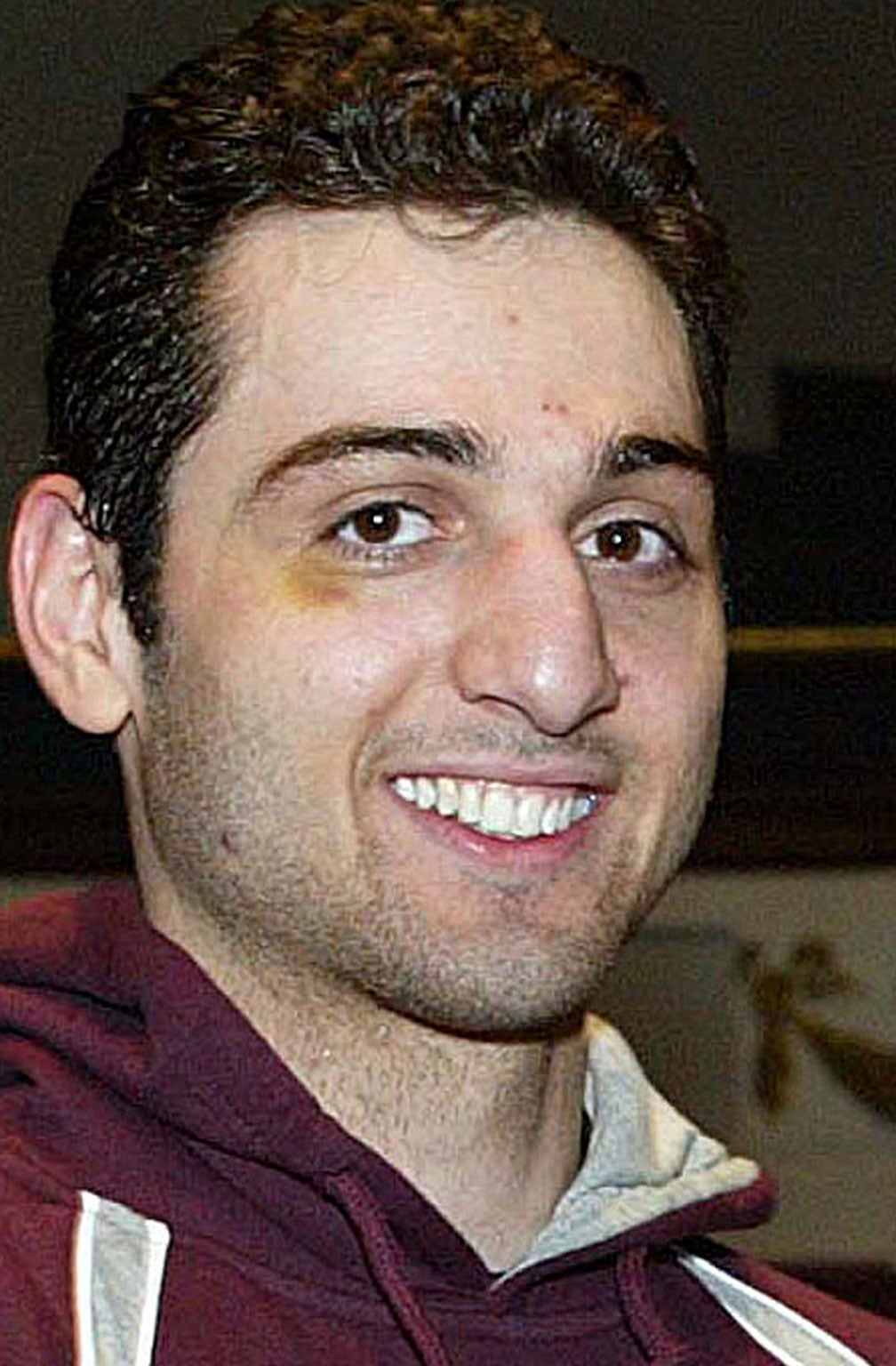Boston bombing suspect Tamerlan Tsarnaev was on CIA terror database say officials amid claims his brother was unarmed when arrested
Officials said that Tamerlan Tsarnaev had been added to the Terrorist Identities Datamart Environment (Tide) at the request of the CIA

The dead Boston marathon bombing suspect, Tamerlan Tsarnaev, was added to a CIA terror database just 18 months before the attack, US officials have confirmed.
The FBI had already investigated Tamerlan Tsarnaev, 26, but had found no evidence of any threat.
Tsarnaev died in a shootout with police last Friday after a manhunt following the attack that killed three people and wounded more than 260.
Officials said that Tamerlan Tsarnaev had been added to the Terrorist Identities Datamart Environment (Tide) on the request of the CIA.
The classified database contains 745,000 entries - though individuals on that list are not necessarily on the terrorist watch list.
US intelligence were alerted when Tsarnaev travelled to a volatile region of Russia, US officials said yesterday, raising new questions about the government's handling of the case and how well law enforcement agencies share information and cooperate with one another.
The trip to southern Russia has come under scrutiny over whether he became involved with or was influenced by Chechen separatists or Islamic militants there, according to US officials who spoke on condition of anonymity.
As further details emerged regarding what authorities knew about the brother's accused of the bombings, unnamed officials told Associated Press that Dzhokar Tsarnaev, who remains in hospital, was unnarmed when he was arrested hiding inside a boat in a neighborhood back yard.
The report directly contradicts Boston police claims that Dzhokar Tsarnaev had been involved in a firefight with officers before he was captured.
According to the New York Times an M4 rifle had been found on the boat - another claim contradicted by the Associated Press source.
Police say the ethnic Chechen brothers Tamerlan and Dzhokhar Tsarnaev planted and detonated two pressure-cooker bombs near the finish line of the Boston Marathon on April 15.
Tamerlan Tsarnaev was killed in a shootout with police four days later, and Dzhokhar Tsarnaev, 19, was wounded and captured.
He is hospitalised in fair condition and charged with two crimes that carry the possibility of the death penalty.
The disclosure of the second warning from the Russians raised questions about whether the CIA and the FBI failed to share the information, even after reforms enacted to prevent information-hoarding following the September 11, 2001, hijacked plane attacks.
"That's something that we have to look at," said Senator Dan Coats, a Republican from Indiana and member of the Senate Intelligence Committee. "That's one of the key things that we have learnt and need to work on to make sure it doesn't happen again, and that is simultaneous communication to all the relevant agencies when a warning is posted."
The two bombs in Boston were detonated with the kind of remote device used to control a toy car, US investigators said in a briefing to a House of Representatives panel yesterday.
The briefing by the FBI and the Department of Homeland Security to the House Intelligence Committee revealed that the two brothers apparently became radicalised by anti-US information on the internet, members of Congress said.
"It looks like they built their bomb based on Inspire magazine and the article said how to build a bomb in mom's kitchen," said Representative Dutch Ruppersberger of Maryland, the top Democrat on the House Intelligence Committee.
The online magazine Inspire, circulated by Yemen-based al- Qa'ida in the Arabian Peninsula, publishes English-language exhortations to would-be Western jihadists to carry out attacks with whatever means they have at hand. It recently published detailed instructions on how to build homemade devices.
"The younger bomber in whatever type of communication he's using said that's where they got the instruction to build the bomb," Ruppersberger said.
Authorities say attention has focused on the elder brother as the driving force behind the bombings. As part of the FBI's probe in 2011, his name had been entered into a US Customs and Border Protection database known as TECS.
US officials said that when he left the United States for a six-month stay in Russia in January 2012, the TECS database sent an alert to the Joint Terrorism Task Force, a multi-agency FBI-led body in Boston.
It remains unclear what investigators did with the information.
Ruppersberger said the FBI went back to the Russians repeatedly seeking more information but got no response.
"They followed through the protocols that were necessary once they got that information, but then they got no other information from the Russians," he said.
Adam Schiff, a California Democrat on the House committee, said he felt the inquiries from the Russians "were appropriately followed up upon."
"Our agencies get thousands and thousands of leads like we did from the Russians," he said, noting that some are efforts by foreign governments to go after political dissidents.
Schiff said the Boston bombings posed a new kind of threat to the United States, "where we're now facing more what Europe has faced, with an alienation of part of the immigration population and self-radicalisation.
"That's a different challenge than those that are trained overseas or receive material support from overseas and come here to attack us, and I think that will cause us to do some things differently," he said.
The briefing indicated that some of the elder brother's dissatisfaction may have stemmed from the US wars in Iraq and Afghanistan, Ruppersberger said.
Join our commenting forum
Join thought-provoking conversations, follow other Independent readers and see their replies
Comments
Bookmark popover
Removed from bookmarks